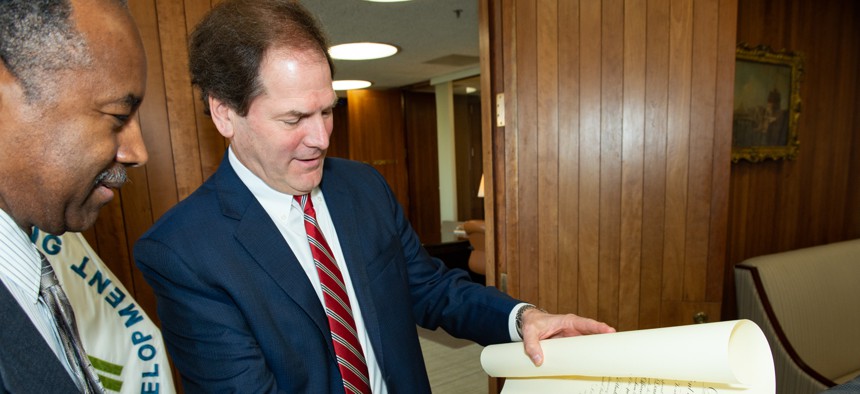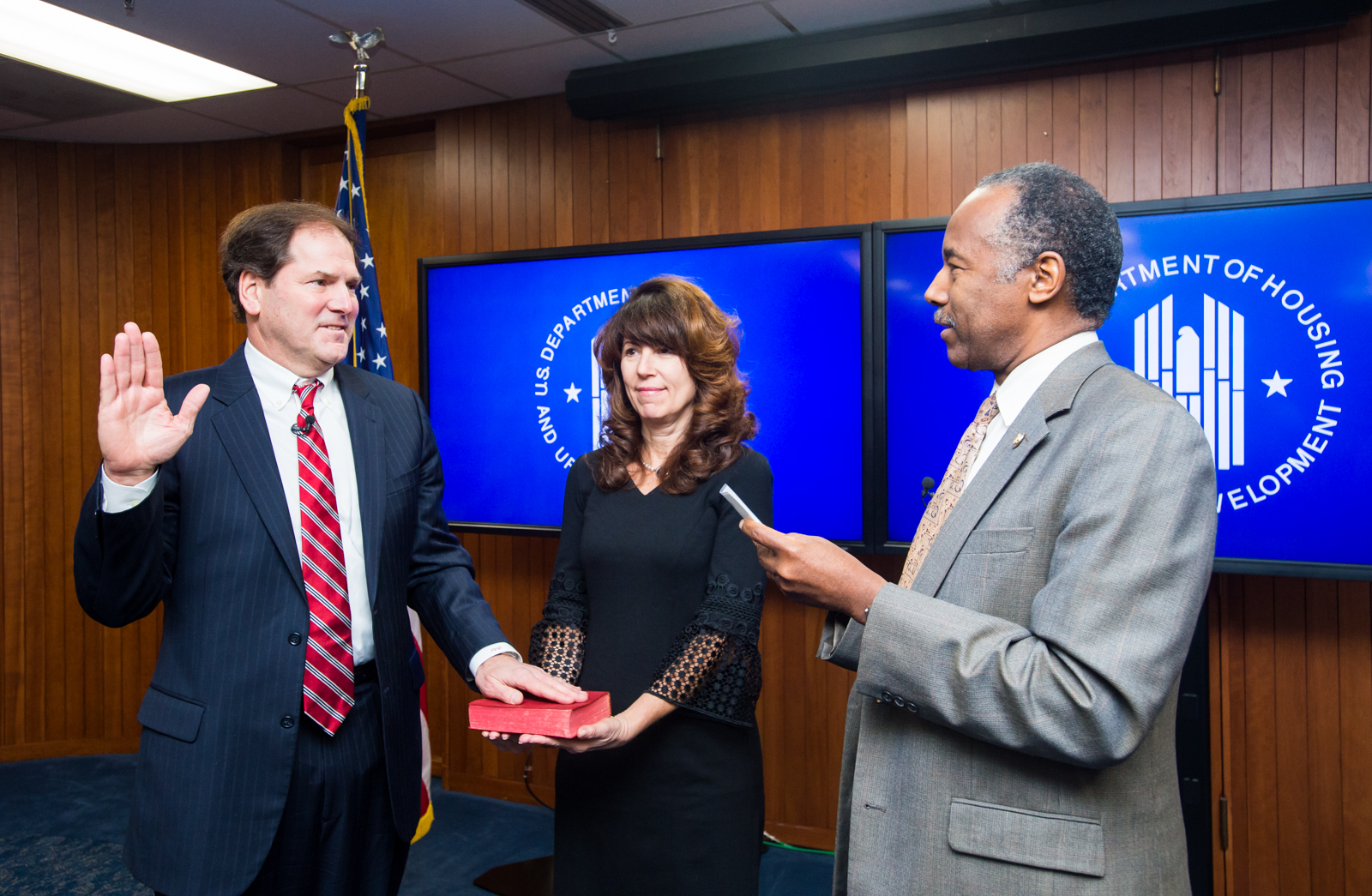
HUD Chief Financial Officer Irv Dennis at his swearing-in ceremony with Secretary Ben Carson. HUD Photo
HUD’s Irv Dennis On Applying Private Sector Experience to Improve Financial Practices
“The people at HUD are strong, smart and mission-driven,” the department’s CFO says.
Irv Dennis is applying almost four decades of experience in the private sector to his role now as chief financial officer at the Housing and Urban Development Department.
Before taking on the role in January 2018, he was a partner for 37 years at the multinational professional services firm Ernst & Young, where he served some its largest clients. Now he’s applying that experience to oversee a department of about 7,500 employees with field offices all over the country.
“Secretary [Ben] Carson was very interested in having HUD operate more like a private sector company with an increased emphasis on financial excellence,” said Dennis. “The people at HUD are strong, smart, and mission-driven, which is very similar to the private sector. HUD’s employees are passionate about their work and HUD’s mission.”
Government Executive interviewed Dennis via email late last month about his transition from the private to the public sector, his financial and information technology improvement initiatives at HUD, handling of telework, use of pandemic relief funds and advice for aspiring federal employees. The interview has been lightly edited for length and clarity.
What made you interested in serving in government?
After a 37-year career with Ernst & Young, I retired as a senior global audit partner, but I still had a lot of energy and wanted to keep my mind busy and active. I always had a desire in retirement to do meaningful work and give back. I was initially contracted to go teach at Ohio State University until I received a call from the White House Personnel Office inquiring about my interest in the position of CFO at HUD. At this point, I was not sure if I was looking to do something full time. However, after meeting with Secretary Carson, I realized the meaningfulness of HUD’s mission and the opportunity that I had in front of me. I was not involved in the government practice at Ernst & Young. I focused mainly on global auditing work. After a period of thought, I felt that this would be a great opportunity to serve the American people and meet my objective of doing meaningful work and giving back. After making this decision, I went through the full Senate approval process and in January 2018 I was sworn in.
How have you applied your experience in the private sector to your work at HUD?
In the private sector, I worked with large, global companies, so I understood the importance of excellence in financial infrastructure. HUD had substantial deficiencies and weaknesses in its financial reporting and the financial control process. When I started at HUD, we had 13 areas that either could not be audited or had material weaknesses in our financial processes. Despite this, I fully believed in the capability of HUD’s people to improve its infrastructure consistent with private-sector standards. HUD is a very complex agency. It directly oversees Community Planning and Development, Fair Housing and Equal Opportunity, Public and Indian Housing, [the Federal Housing Administration] and [the Government National Mortgage Association]. Every program operated in a silo without a unified approach.
Secretary Carson was very interested in having HUD operate more like a private sector company, with an increased emphasis on financial excellence. Immediately, I established the Agency-Wide Integrity Task Force to focus on the various operating areas that needed improvement. Then I developed and implemented a detailed financial transformation plan to improve financial operations. When I evaluated companies at Ernst & Young, I focused on governance, people, processes and technology. I realized improvement was needed in each of these areas at HUD. Initially, I expected this to be a three to five year transformation. However, after two and a half years, I am proud to say that we decreased material weaknesses down to one in 2019 and are expecting clean financial statements for the first time in seven years at the end of this year.
Another key area for improvement was HUD’s technology. The IT systems at HUD are old and antiquated. I knew that there would be an opportunity to convert paper processes and manual work to current IT modernization technology, such as robotics and artificial intelligence. Through partnerships with the Office of American Innovation with Jared Kushner and the General Services Administration’s Center of Excellence, we initiated a digital transformation process throughout HUD. To date, we are on track to convert 70,000 employee hours of work to robotics by the end of this year. We have also implemented intelligent data extraction technology and dashboard visualization capabilities. We are working closely with the HUD chief information officer to develop a digital transformation plan to make further improvements with HUD’s business processes and controls.
Was it a difficult transition going from the private to the public sector?
When I started this process, I knew very little about the inner workings of Washington or the government. Again, at Ernst & Young, I was not in government practice. However, I did know the importance of strong financial controls. The personnel in the CFO’s office, and the agency, embraced the improvements that I wanted to make. The people at HUD are strong, smart, and mission-driven, which is very similar to the private sector. HUD’s employees are passionate about their work and HUD’s mission. While the IT systems are more antiquated in comparison to what I am used to, I think the biggest obstacle to working in government is the inability to control resources the same way that you can in the private sector. For example, every dollar spent has to go through the formal appropriation process; this took some getting used to. Furthermore, it is even harder to control employee assignments in comparison to the private sector. In government, it is much harder to hire and move people around at will, so controlling human resources was something that I had to adapt to as well. If I were working in the private sector, I think it would have only taken 18 months to get where we are now, as opposed to the two and a half years. That being said, I am very proud of what we have accomplished and am determined to keep working on improvements.

In addition to your finance and IT initiatives, what are some of your most significant accomplishments since taking office?
We developed a dashboard to analyze and monitor program spending on [the Coronavirus Aid, Relief and Economic Security] Act funding distribution. In addition, this portal shows a 25-year geographical history of HUD funds of more than $1 trillion. I am very proud that we are making process changes to increase the transparency and accountability of HUD’s funds.
Another benefit from adopting my private sector experience to HUD is it has allowed our staff’s
[Federal Employee Viewpoint Survey] scores to go from last to leading at HUD. I am proud that my team is energized, engaged and enjoying the changes that we are making. Our improvements have allowed us to develop our overall effectiveness and efficiency while letting us better serve our stakeholders and the American people as a whole.
How has the coronavirus pandemic impacted your work and workforce operations?
I think the changes that we made have been effective and I am grateful for the flexibility of our staff. I stressed that the COVID-19 cannot be an excuse for not reaching the goals we set for ourselves. This has been a guiding principle surrounding everything we have done so far through teleworking. When I think about the effect of the pandemic, we had $12.5 billion appropriated to us, which represents about 22% of our total program funds. The money came at us fast, and we were determined to make sure that we were able to process it and get it out promptly while maintaining a focus on our adherence to regulations and oversight. I wanted to ensure that the distribution of this money complied with the strong financial controls that we developed and implemented. To monitor CARES Act funding, we established the HUD CARES Act Compliance Response Team. It is the framework to monitor the funds being obligated and dispersed following the regulations of the CARES Act.
Working from home is new for a lot of us, but the CIO did a great job of giving us the tools to ensure that we remain productive. We have consistently been 100% productive and have not missed a beat as it relates to transaction processing and reporting. As it relates to financial transformation initiatives, our work started a little slow, but we got comfortable with Microsoft Teams, and are now operating at 100% capacity. Our HUD team has responded well to this challenge and I am proud of our employees for being focused on our mission, controls and processes to ensure that we do not have hiccups.
What advice do you have for recent college graduates or those looking to make the transition from the private to the public sector?
This is a great question. In the context of recent, or upcoming graduates, and especially for those coming out of business schools, I would assure them that there are great opportunities for students to get involved with government. To be honest, this is a perspective that I did not necessarily hold before I started at HUD. There are a lot of very smart, mission-driven people who are very engaged. The government workforce is very similar to what I experienced in the private sector. My message to a college student or young professional is do not be afraid to choose the federal government as a career path. There are many opportunities and many different ways to add and create value in your resume through the government. The government is interesting, fun, and it is fascinating to understand how it operates to help the American people. Working at HUD allowed me to see what the press largely does not report, and that is all of the great initiatives that the administration is doing for the American people. I see firsthand every day how hard everyone on our staff works to assure that we are serving the American people efficiently and effectively. It also gives you a strong sense of pride. I firmly believe that no one should hesitate to consider the government as a career path.







